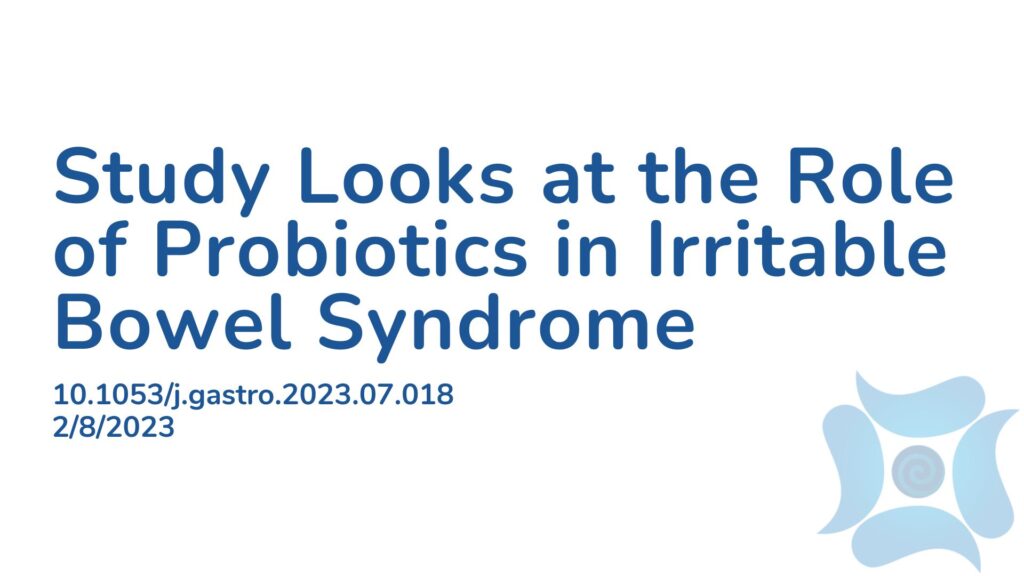Summary:
Irritable Bowel Syndrome (IBS) is a condition of the gut-brain relationship, often characterized by abdominal pain, abnormal stool frequency and either diarrhea or constipation, or both. Approximately 5% of the global population have IBS and it has a substantial impact on quality of life. Because the pathophysiology of IBS is not entirely understood, the current medical treatments are aimed at managing the symptoms which are reported from the patient. Unfortunately, this approach has little efficacy. Approximately 10% of people with IBS note that their symptoms commenced following an enteric infection, which is known as post-infectious IBS. This has lead to the understanding that the health of the gut microbiome may be involved in the pathophysiology of IBS. This meta-analysis looks at the current evidence on the use of probiotics in IBS. 24 randomised controlled trials were included for analysis that used specific probiotic strains and compared them with a placebo in the treatment of IBS. Overall, there was moderate evidence supporting the benefit of Escherichia strains, low certainty for Lactobacillus strains and Lactobacillus plantarum 299V, and very low certainty for combination supplements such as multi-strain probiotics. For abdominal pain, there was low certainty in the evidence for a benefit of Saccharomyces cerevisiae I-3856 and Bifidobacterium strains, and very low certainty for multi strain probiotics, Lactobacillus, Saccharomyces, and Bacillus strains. There was also low certainty for the use of these strains and abdominal bloating. The paper concluded that whilst some combinations of probiotics may be beneficial in IBS, the overall results showed very low certainty or efficacy.
Abstract:
Background & aims: Some probiotics may be beneficial in irritable bowel syndrome (IBS), but differences in species and strains used, as well as endpoints reported, have hampered attempts to make specific recommendations as to which should be preferred. We updated our previous meta-analysis examining this issue. Methods: MEDLINE, EMBASE, and the Cochrane Controlled Trials Register were searched (up to March 2023). Randomized controlled trials (RCTs) recruiting adults with IBS, comparing probiotics with placebo were eligible. Dichotomous symptom data were pooled to obtain a relative risk of global symptoms, abdominal pain, or abdominal bloating or distension persisting after therapy, with a 95% confidence interval (CI). Continuous data were pooled using a standardized mean difference with a 95% CI. Adverse events data were also pooled. Results: We identified 82 eligible trials, containing 10,332 patients. Only 24 RCTs were at low risk of bias across all domains. For global symptoms, there was moderate certainty in the evidence for a benefit of Escherichia strains, low certainty for Lactobacillus strains and Lactobacillus plantarum 299V, and very low certainty for combination probiotics, LacClean Gold S, Duolac 7s, and Bacillus strains. For abdominal pain, there was low certainty in the evidence for a benefit of Saccharomyces cerevisae I-3856 and Bifidobacterium strains, and very low certainty for combination probiotics, Lactobacillus, Saccharomyces, and Bacillus strains. For abdominal bloating or distension there was very low certainty in the evidence for a benefit of combination probiotics and Bacillus strains. The relative risk of experiencing any adverse event, in 55 trials, including over 7000 patients, was not significantly higher with probiotics. Conclusions: Some combinations of probiotics or strains may be beneficial in IBS. However, certainty in the evidence for efficacy by GRADE criteria was low to very low across almost all our analyses.
Article Publication Date: 2/8/2023
DOI: 10.1053/j.gastro.2023.07.018



